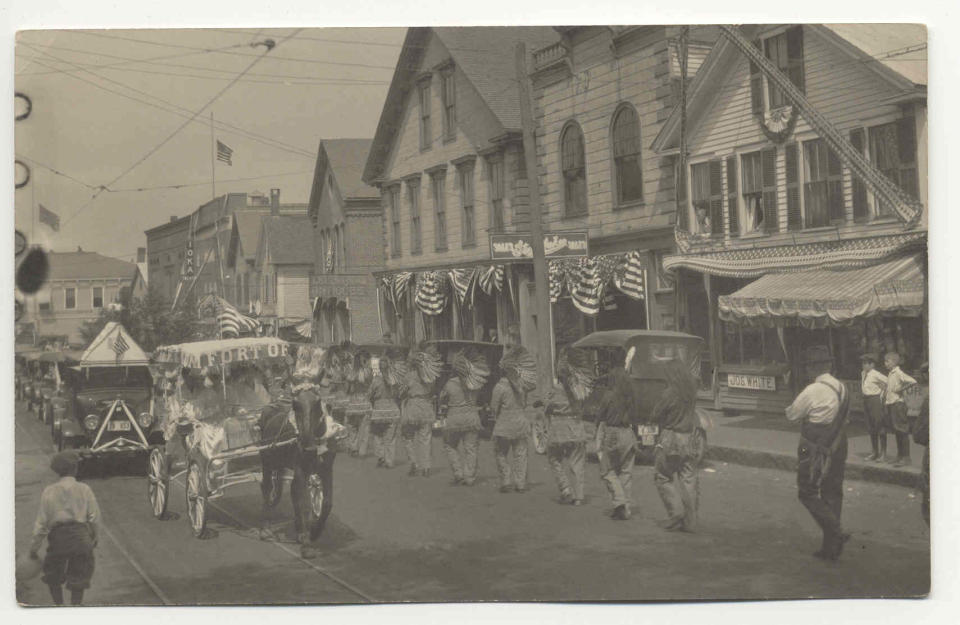Historically Speaking: How Exeter experienced the roaring twenties in 1923
Exeter began 1923 with a new schoolhouse on the appropriately named School Street. The town had voted to remove two rickety old wooden schools from the same location the previous year.
The new school building (which still exists as part of SAU 16), was the most modern school erected in years. It was sleek – brick and stucco – with central heating, indoor plumbing with restrooms conveniently located in the basement, large windows that provided both light and ventilation, and electric lighting for those cloudier days when natural light caused the students to squint in the dim gloom. The public was invited to view the school before the beginning of the new term.
In March, the town approved funding to fully electrify the streetlights.

If 1923 was the height of the ‘roaring twenties’ elsewhere in the United States, it was reflected as very wholesome in the pages of the Exeter News-Letter. There was certainly illegal drinking going on in town, but to read the local paper, you’d be hard put to find it. There was, however, plenty to do during the year. In May, the Alliance of the Unitarian Church held its 68th annual May Fair. They chose a Japanese theme for the event, perhaps inspired by the cherry blossom trees donated to the U.S. a decade earlier. Along with the usual food and sweets (including strawberry shortcake and ice cream), there was a mystery booth for the children, it “represented a garden of evergreen trees and azaleas on which alighted gay-colored butterflies…the children selected a butterfly and a number on the back of each corresponded with a number on a mystery package.” The day concluded with an exhibition of dancing, including a May pole dance.
Historically Speaking: The long path to municipal water in Exeter
As summer began, the town worried about the lack of rain. From Massachusetts, there was an unusual solution to the ever-present problem of gypsy moths: use a dirigible to spray lead powder onto the trees. Caterpillars would eat this poison, and there would be no further moths the following year. As crazy as it sounds to us, it was actually trialed in Deering, New Hampshire. Luckily for the inhabitants, the equipment jammed, and the project was abandoned.
By August, there continued to be little rain, but people in town were excited with preparations for the Carnival and Old Home Day. As the parade committee met, word reached Exeter that President Warren Harding had died. It began a series of memorial services and public mourning. The parade and other events were held, as planned, two weeks later. The day’s events began with a grand parade, followed by events throughout the day. “Evening interest centered in the Square, which has seldom, if ever, been so crowded. Cars were closely parked about and near it, and sidewalks, the Town Hall steps, and embankment, and other vantage points were thronged with spectators, all animated by the carnival spirit.” Just after 9 p.m., dancing in the square to the music of the Exeter Band. More dancing followed, inside the town hall, after 10 p.m.
Historically Speaking: Lieutenant Kenneth Fuller of Exeter
The earlier vote to install electric streetlights must have caused a bit of regret when, in late August, Seth Buckley, formerly of Exeter, died after being electrocuted while changing wires on a pole in Amesbury. According to the News-Letter, this wasn’t his first brush with death. “He had been off duty for nearly two years on account of injuries received while working on a pole in Merrimac and had been working less than a week.”
September brought news of the Great Kanto earthquake in Japan – a sobering bit of news for those who had attended the Japan-themed May Fair. The quake, which affected the cities of Yokohama and Tokyo, lasted for upwards of ten minutes. A 40-foot-high tsunami struck several minutes later, followed by devastating fires that burned for two days. Estimates of deaths were around 140,000 people.
Exeter’s whirl of gaiety continued in October, with two public events held at the Town Hall. Gilman Grange held their fair on Oct. 5 with “varied exhibits, artistic booths and decorations. The County Farm, Robinson Seminary, public schools and scores of private exhibitors contributed to large and meritorious exhibits of fruit, vegetables, canned goods, etc.” The following week another fair, spanning several days, was held by the Knights of Columbus. Like the Grange, the hall was decorated, and booths were set up. “Sales of blankets on commission, refreshments, useful and fancy articles, etc.” raised a goodly sum for the organization.
Historically Speaking: What’s in a Name? Changing street names in Exeter
The increasing number of cars in town led to this cautionary tale: “There were a few exciting moments Wednesday evening before the McReel garage. The driver of a car passing through Exeter was replenishing his supply of gasoline and to see if he had taken enough, held a lighted match above the tank. The natural result was that the escaping gas burst into flames. Mr. William A. McReel, by effective use of an extinguisher, quickly quenched the flames and none too soon. The damage was slight.”
As the year came to a close, the weather continued to be as dry as prohibition in Exeter. John Templeton, the editor, reflected, with the optimism of the 1920s, “The year now drawing to its close has been marked by appalling convulsions of Nature, notably the Japanese earthquake, and many other distressing events, among them the death of a beloved President. It has, however, brought more of good than of ill.”
Barbara Rimkunas is the curator of the Exeter Historical Society. Support the Exeter Historical Society by becoming a member. Join online at www.exeterhistory.org.
This article originally appeared on Portsmouth Herald: Historically Speaking: A look back at Exeter in 1923

